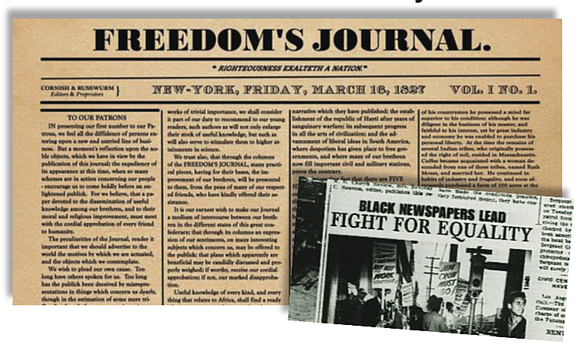The Black Press celebrates 195 years of pleading the cause of African descendants everywhere, by Stacy M. Brown
3/24/2022, 6 p.m.
On March 16, 1827, the Rev. Samuel E. Cornish and John B. Russwurm founded Freedom’s Journal, the first Black-owned newspaper in the United States.
They did so because there were no Black voices in the debate over the abolition of slavery.
In their first editorial, Rev. Cornish and Mr. Russwurm wrote: “In short, whatever concerns us as a people, will ever find a ready admission into the Freedom’s Journal.”
Now, 195 years later, “the mission of the Black Press has not changed,” Washington Informer Publisher Denise Rolark Barnes wrote in an editorial. “No matter whether Black Press journalists are invited to a seat at ‘their’ table, the voices of those the Black Press represents will always have a seat at ours,” Ms. Rolark Barnes wrote.
From Freedom’s Journal to the North Star to John Abbott’s Chicago Defender, African-American-owned newspapers have sparked fires for truth and equality that have burned with the passion of fighting for freedom throughout history. This year marks the 195th anniversary of the Black Press of America, whose global impact remains undeniable.
It all began with Freedom’s Journal.
On March 16, 1827, they announced its presence with a front page that contained these words: “We wish to plead our own cause. Too long have others spoken for us.”
The four-page edition included stories about the struggle to end the horrors of slavery, lynching and social injustice. It also informed the African-American community of international news of particular interest like events in Haiti and Sierra Leone.
Freedom’s Journal featured African-American men and women, biographies, schools, jobs and housing opportunities.
For nearly two centuries, the 230 African-American-owned newspapers and media companies now represented by the National Newspaper Publishers Association have proudly carried that legacy. The bond between Black America and the Black Press remains strong.
“Relationships, which have been the cornerstone of the Black community and the Black Press for 195 years, have always been its messenger in cementing that bond,” remarked Westside Gazette Publisher Bobby Henry.
Dr. Toni Draper, publisher of the 130-year-old AFRO in Baltimore and Washington, also noted the enduring value of the Black Press.
“The contribution of the Black Press is invaluable. If not for the Black Press, there would be a lot of things we would not have documented in terms of the African-American experience,” Dr. Draper said. “African-Americans were not in any of the pages of the white-owned press unless there was an advertisement of our sale, of our resale or us having run away from slave owners or plantations.”
Dr. Draper continued: “The Black Press is one of the only places where you can find news and information and commentary about, by and for African-Americans across the spectrum. You don’t have to do anything wrong to make the pages of the Black Press; you don’t have to do anything famous. The Black Press covers the totality of the Black experience in the United States and beyond.”
The anniversary of the Black Press is a reminder of the contributions that remain indelibly associated with the fearlessness, determination and success of the Black Press. Those contributions include the works of Frederick Douglass, W.E.B. DuBois, Ida B. Wells, Patrice Lumumba, Kwame Nkrumah and former NNPA Chairman Carlton Goodlett.
Mr. Douglass, who helped enslaved people escape to the North while working with the Underground Railroad, established the abolitionist newspaper The North Star, in Rochester, N.Y. He developed it into the most influential Black anti-slavery newspaper published during the antebellum era.
The North Star denounced slavery and fought for the emancipation of women and other oppressed groups with a motto of “Right is of no Sex – Truth is of no Color; God is the Father of us all, and we are all brethren.”
Today, the Black Press continues to reach across the ocean where possible to forge coalitions with the growing number of websites and special publications that cover Africa daily from the continent.
“The spirit of Black journalism, which Mr. Russwurm and Rev. Cornish inspired, found its way to Houston 128 years later through a vision given to a local Black businessman to birth a newspaper that positively reflected the Black community, while also reporting the hard truths happening in our communities on the local, state and national levels,” Jeffrey Boney, associate editor of the Houston Forward Times declared.
The evolution of the Black Press had proprietors take on issues of chattel slavery in the 19th century, Jim Crow segregation and lynching, the great northern migration, the Civil Rights Movement, the transformation from the printing press to the digital age and computerized communication.
With the Plessy vs. Ferguson U.S. Supreme Court ruling in 1896 that said no Black man has any rights that a white man must honor, there came a flood of Black publications to advocate for Black rights and to protest the wrongs done to Black people.
Today, the Black Press continues to tackle domestic and global issues, including the coronavirus pandemic and its effects on all citizens, particularly African-Americans.
“This is an important story about the history of the Black Press of America that has consistently been the freedom fighting voice of African people in America and throughout the world for 195 years without waiver or distortion of the truth,” stated Dr. Benjamin F. Chavis Jr., president and chief executive officer of the NNPA.
“Today in 2022, the Black Press remains the vital source of news and information for 50 million African-Americans,” he added.
“On this momentous anniversary,” Dr. Chavis continued, “the NNPA salutes all the African-American-owned newspapers and media companies that are affiliated with the NNPA’s expanding network of over 230 media properties and channels.”
The writer is the senior national correspondent for NNPA Newswire.








